
Who earns the most at the beginning of their careers?
A PhD degree is the first major step in the life of a scholar. The ELA system monitors how doctoral graduates fare in the labour market and their earnings.
This analysis focuses exclusively on the earnings of graduates with PhD degrees. No other labour market aspects are discussed because the risk of unemployment in this group of individuals is below 1%—about a dozen times lower than among master’s graduates. Some doctoral graduates are completely unaffected by unemployment. For this reason, the ranking concentrates exclusively on their earnings.
To be fully comparable in terms of time and of territory, our rankings rely on the relative earnings rate, which compares graduates' earnings to the average earnings in the Polish powiats where they reside. No information is available on some cohorts and higher education institutions, as the number of doctoral graduates is insufficient to be statistically viable. Consequently, only the data for three cohorts (2014, 2015 and 2016) is presented. This methodological approach prevents individual deviation from the general level, while the relative earnings rate enables us to present the combined activities of the monitored groups in different time intervals.
The ranking of domains of study: engineers top the list again
Figure 1. Relative earnings rates in the five years after obtaining a PhD degree by domain of study
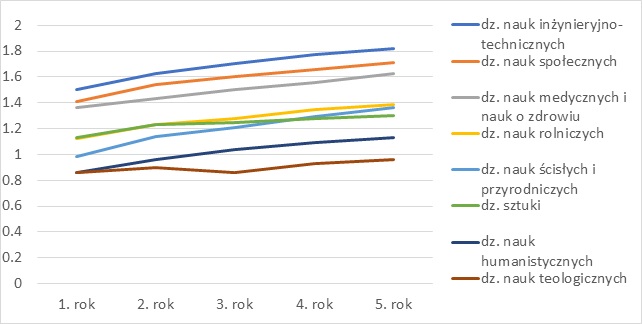
During the entire monitoring period, graduates of engineering boasted the highest relative earnings. Social scientists retained second place. The bottom two places were occupied by graduates of the humanities and of theology.
Below, we present the five higher education institutions whose graduates achieved the best financial results in the fifth year of the monitoring period. To make the results easier to interpret, the charts include relative earnings rate values for all doctoral graduates in specific domains of science.
Humanities
Particular attention should be paid to the excellent performance of doctoral graduates of Aleksander Gieysztor Academy of Humanities in Pułtusk. This nonpublic higher education institution has outperformed all public institutions in Poland. The reason may be its high number of students who followed extramural programmes. The rapidly growing earnings of doctoral graduates from the University of Rzeszów is also noteworthy.
Figure 2. Relative earnings rates in the five years after obtaining a PhD degree in humanities: the top five higher education institutions
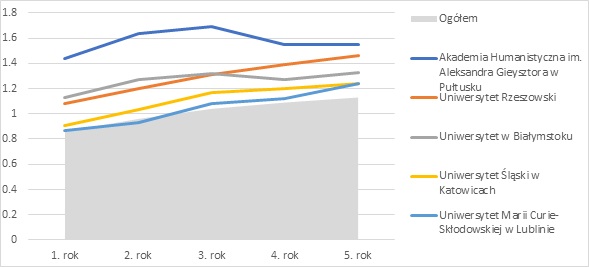
Engineering and technology
Figure 3. Relative earnings rates in the five years after obtaining a PhD degree in engineering and technology: the top five higher education institutions

No significant differences were revealed in the relative earnings of doctoral graduates of the top five engineering and technological higher education institutions. Graduates of this field have stable jobs and are generally well paid. The top place in this year's ranking is once again occupied by the graduates of the Rzeszów University of Technology. Their strong position in the labour market may signal dynamic changes in the Podkarpackie province, where it is difficult to compete for a job.
Medical and health sciences
Figure 4. Relative earnings rate in the five years after obtaining a PhD degree in medical and health sciences: the top five higher education institutions

First place is occupied by doctoral graduates of the Polish Mother's Memorial Hospital – Research Institute in Łódź, followed by graduates of institutions in Warsaw and Lublin (the Institute of Rural Health).
Agricultural sciences
Figure 5. Relative earnings rates in the five years after obtaining a PhD degree in agricultural sciences: the top five higher education institutions
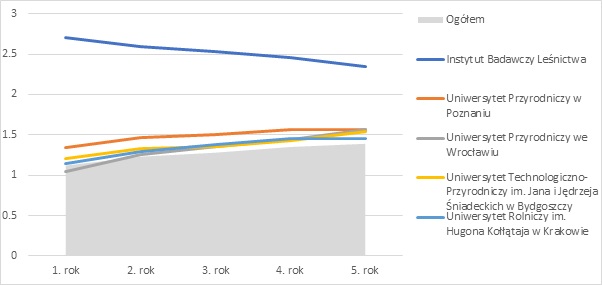
The most successful graduates of agricultural sciences in the labour market include those with PhD (and master's) degrees in forestry. The highest incomes were generated by those who earned their PhDs from the Forest Research Institute in Sękocin Stary. They were significantly ahead of their peers from Poznań, Wrocław, Bydgoszcz, and Kraków.
Social sciences
Figure 6. Relative earnings rates in the five years after obtaining a PhD degree in social sciences: the top five higher education institutions

First place in the social sciences ranking is somewhat surprising: it is occupied by doctoral graduates of management and quality at the Częstochowa University of Technology. Five years after their graduation, they outperformed young scholars from the Warsaw School of Economics, whose earnings, at the beginning of the monitoring period were comparable. The trend in the earnings of graduates of Kozminski University in Warsaw is unique: the remuneration offered to these alumni was very high in the first year and considerably lower in later years, dropping below that achieved by the two leading institutions. The graduates of the remaining two institutions saw gradual increases in their incomes. It is worth noting that the Polish Naval Academy of the Heroes of Westerplatte, a top five institution in the social sciences category, offers doctoral programmes for students who wish to specialise in safety sciences.
Exact and natural sciences
Figure 7. Relative earnings rates in the five years after obtaining a PhD degree in exact and natural sciences: the top five higher education institutions
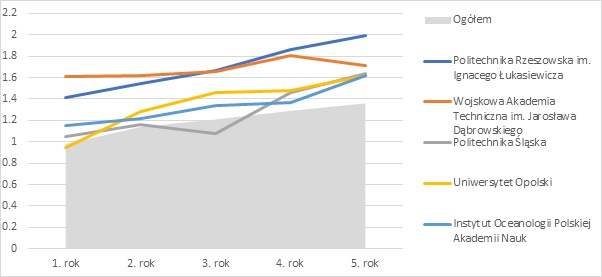
In exact and natural sciences, as in the case of engineering and technology, the highest earnings are achieved by graduates of PhD programmes at the Rzeszów University of Technology. The institution’s alumni competed for first place with graduates of the Military University of Technology in Warsaw.
Theology
Figure 8. Relative earnings rates in the five years after obtaining a PhD degree in theology: the top five higher education institutions

The Christian Theological Academy in Warsaw is the uncontested leader in the theology category. The earnings of graduates of other institutions are comparable to the average earnings of all the graduates of theology.
Fine arts
Figure 9. Relative earnings rates in the five years after obtaining a PhD degree in fine arts: the top five higher education institutions
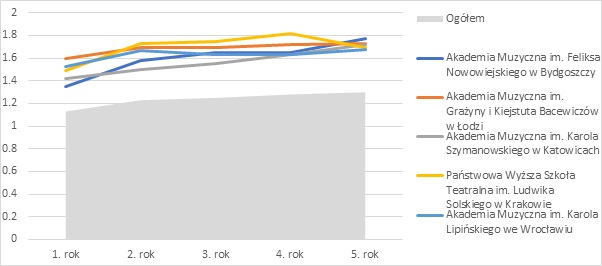
No significant differences can be observed in the earnings of graduates of the top-tier higher education institutions in the fine arts; it should be stressed, however, that four of them are musical academies (which were joined by the National Academy of Theatre Arts in Kraków).